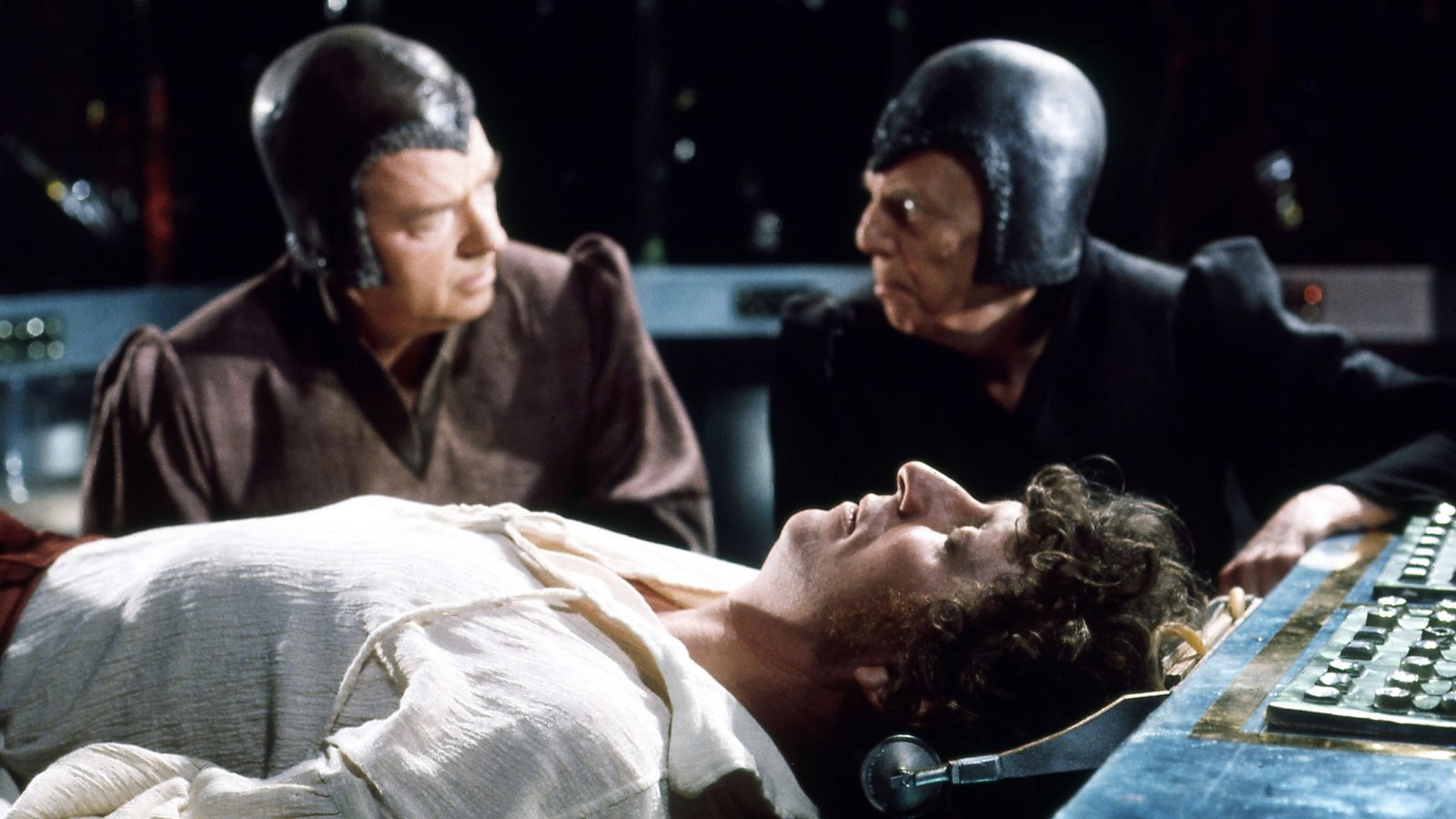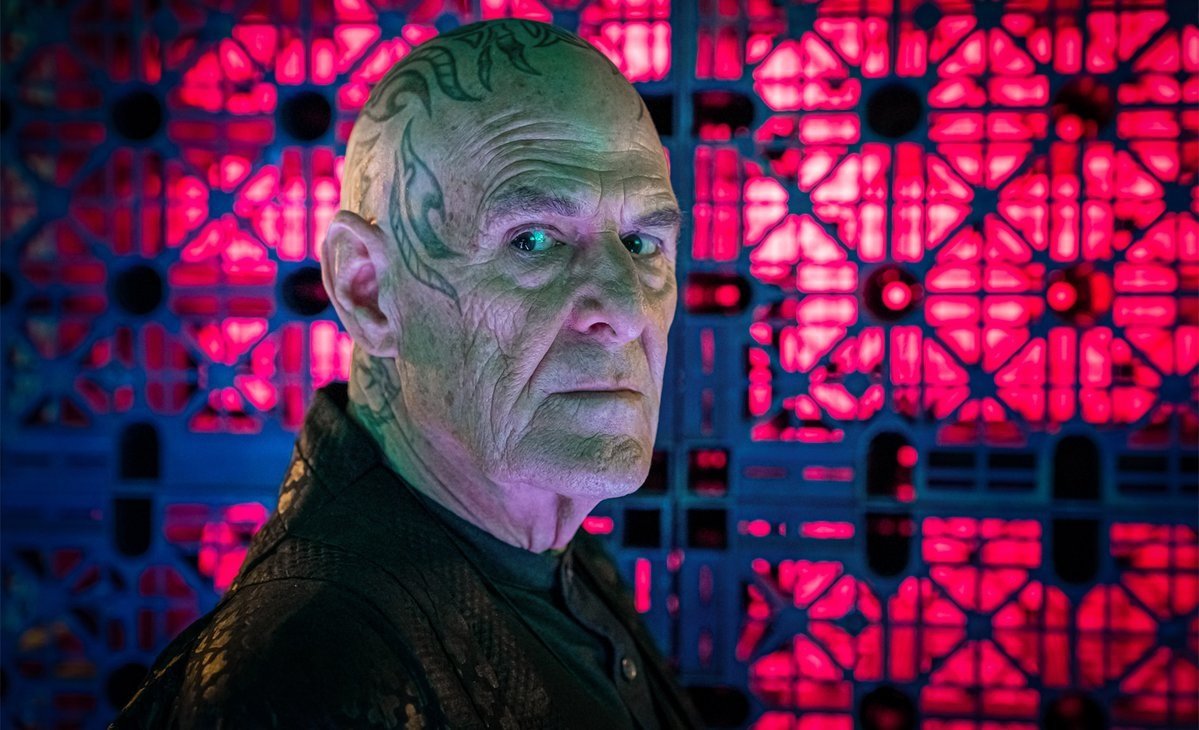Doctor Who has always meant well. It wants to see the best in people, it wants to make the best of people, and it personifies those two principles in a lead character who is ‘never cowardly, never cruel’ and always fights with the oppressed.
While many stories, perhaps even the majority, have not had a ‘message’, many of the best have addressed themes and issues; often skilfully fusing the epic with the charmingly suburban. Hartnell’s historical serials under Verity Lambert were definitely political – because history is so often merely politics plus time. Troughton’s The War Games carried strong anti-war metaphors about class, propaganda, and international solidarity within its child-friendly adventure. The Third Doctor and Brigadier Lethbridge-Stewart often rehearsed the arguments of militarism versus pacifism and, in The Green Death, they combined to battle a corrupt corporation wrecking the environment and ruining lives. In The Sun Makers, the Doctor battled ultra-capitalism, he advocated animal rights in The Two Doctors, he battled for gay rights in The Happiness Patrol, and orated against nuclear weapons in Battlefield.
There are many more instances of this I don’t have space to list: but listen carefully to Doctor Who and you can often hear the sound of empires toppling (or at least being given a progressive kick). Somewhere there is injustice, somewhere the tea is getting cold – that’s the grandiose and the domestic, right there — and the Doctor is a warrior against both. Pity the small-minded fools who bleat about ‘political correctness’ or — even more vacuously – ‘wokeness’ ruining the show that they patently have never really understood.
I will therefore never complain that Chris Chibnall wants to address important issues during his reign as showrunner. I applaud him sincerely for wanting to educate audiences on climate change, plastic use, and corporate capitalism or, with fascism stirring across western nations, eugenics advocates ejected from (or still in) No. 10, and misogyny still rife, remind us that the Nazis were evil and witch trials abhorrent. We need all of that. What is the point of having children if we don’t strive to make them better than we were?
But we also need it to be done well: with skill, subtlety, and an understanding that the drama must always come first. Sadly, this is not happening under Chibnall and Can You Hear Me? is the latest episode to fail, as both a drama and, in this case, as a rumination on mental health. It begins well, feeling original, mysterious, and intriguing. Ian Gelder’s Zellin is captivating and his trick with the fingers, pleasingly creepy (five fingers for only two ears…? Well, let’s not delve too deeply). There’s some very belated work to develop Yaz, Ryan, and Graham but, for all the talk of ‘the Fam,’ they’re just 3 mannequins who happen to spend time together and sway with the plot. The drama of the episode fizzles badly with a resolution so perfunctory I expected it to be a false ending. The two immortals are thrown into a ball with a generic monster in a scene far less dramatically satisfying than when the Master and Rani were trapped with an expanding T-Rex. This abbreviated resolution is presumably to clear space for ‘the message’. But the message should be explored through the drama, not shunted aside so the characters can talk about it.

Doctor Who has done mental health before and better with Vincent and the Doctor. Can You Hear Me? feels muddled. It’s nominally a show about mental health problems but the Immortals feed off anxieties and nightmares as well. These are things that, as the Doctor says, we all have, irrespective of whether we have poor mental health. Ryan’s friend Tibo clearly has a mental health problem. Yaz had problems with school, felt anger and resentment, and considered running away from home. Is that a mental health issue or simply being a teenager? Graham fears the return of his cancer and has some measure of irrational guilt over Grace’s death. Again, is that a mental health issue? Any ‘normal’ problem can shade into a mental health issue, of course, but the waters felt muddied to me and the drama did not properly connect with the theme.
Worst of all was the scene in which Graham confides in the Doctor about his fears of his cancer returning. In an episode whose message seems to be that people struggling with their demons should reach out, it seems terribly ill-judged and contradictory. The whole point of the Doctor is that she helps people and yet here, in an episode that wants to encourage people to ask for help, we not only see Graham rebuffed, but by the character famed for providing ‘advice and assistance’ to all. Is this the message they wanted to send?
And here we come to the nub of it for me: that for an era so slated for gratuitous ‘messaging’ or ‘virtue signalling’ those messages and signals are so muddled. The very first scene of Chibnall’s bold new era with a female Doctor, in The Woman Who Fell to Earth, had the lady driver crash the TARDIS. In Arachnids in the UK, the message was that it’s wrong to shoot a spider yourself but it’s OK to leave dozens to suffocate slowly in a vault. In Kerblam!, the satire on a rapacious corporation ended with the message that the real problem was the person fighting it, and in The Witchfinders, the ‘Fam’ win… by becoming witchfinders. In Spyfall, we finally get an Asian Master but then, in Part Two, the Doctor exploits his skin colour to turn the Nazis against him (needlessly in story terms, since his bosses already think the Master a traitor). The Doctor – never cruel, never cowardly, a warrior against injustice – exploits someone’s skin colour to get out of a difficult situation. And now, the Doctor – who reached out across 450 years of life experience to comfort Victoria about the loss of her father, who provided consolation to Adelaide Brooke while telling her History needed her to die, who hugged Amy Pond as she grieved over Vincent’s suicide — this Doctor who never fails to be kind, does exactly that.
All these examples – and the problems with the drama as well – speak of a lack of script-editing, a lack of proper thought and care. The series knows what it wants to do and has the right intentions – it means well — but, like a poor marksman, it keeps missing the target.
Yes, Doctor Who, I can hear you – I’m just not sure what you’re trying to say.



